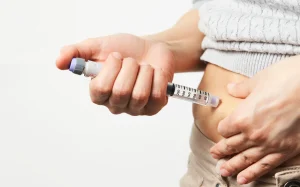DIABETES
DIABETES

Diabetes is a metabolic disease characterised by high blood sugar levels due to insufficient insulin production by the pancreas or ineffective use of insulin by the body. It can be managed through lifestyle changes, medication, and insulin injections.
If left untreated, diabetes can lead to various complications affecting different parts of the body, such as the cardiovascular system, nervous system, feet, and vision.
Symptoms include increased thirst, frequent urination, fatigue, blurred vision, and unhealed sores. Type 1 diabetes is caused by the destruction of insulin-producing cells in the pancreas, while type 2 diabetes results from insulin resistance or low insulin levels. Gestational diabetes occurs during pregnancy.
Natural treatments, along with medical management, can help control blood sugar levels and prevent complications. Foods such as beans, fenugreek, cinnamon, chia seeds, ginger, and hemp seeds, as well as vitamins and minerals like calcium, magnesium, and vitamin B9, can support diabetes management. Regular exercise and a healthy diet are crucial for controlling blood sugar levels.
Description
Diabetes is a chronic condition characterised by high blood sugar levels due to insufficient insulin production or ineffective use of insulin. There are three main types: type 1 diabetes, type 2 diabetes, and gestational diabetes. Symptoms include frequent urination, excessive thirst, unexplained weight loss, fatigue, blurred vision, slow-healing wounds, and recurring infections.
If left untreated, diabetes can lead to serious complications such as cardiovascular disease, kidney damage, neuropathy, and eye problems. Treatment involves lifestyle modifications, medication, and regular monitoring of blood sugar levels.
Individuals with diabetes should actively manage their condition through self-care and regular check-ups with healthcare professionals.
There are different types of diabetes, primarily type 1 and type 2 diabetes, each with its own set of symptoms and characteristics. Here's a breakdown of the symptoms for each type:
- Type 1 Diabetes Symptoms:
Extreme Thirst: Increased thirst (polydipsia) is common due to frequent urination and fluid loss.
Frequent Urination: Excessive urination (polyuria) is a hallmark symptom as the body tries to remove excess glucose from the blood.
Increased Appetite: Despite eating more, individuals may experience unexplained weight loss.
Fatigue: General weakness and fatigue can result from the body's inability to effectively use glucose for energy.
Blurred Vision: High blood sugar levels can affect the eyes and lead to blurred vision.
Numb and Tingling Hands and Feet: Neuropathy or nerve damage can cause tingling or numbness, especially in the extremities.
Unhealed Sores: Slow wound healing is a potential complication of diabetes.
Sudden Weight Loss: Despite an increased appetite, people with type 1 diabetes may lose weight due to the body breaking down muscle and fat for energy.
- Type 2 Diabetes Symptoms:
Frequent Urination: Similar to type 1 diabetes, increased urination is common.
Extreme Thirst: Excessive thirst often accompanies frequent urination.
Increased Appetite: Some individuals may experience increased hunger and unexplained weight gain.
Fatigue: General tiredness and fatigue are common.
Blurred Vision: Vision problems can occur when blood sugar levels are not well controlled.
Numb and Tingling Hands and Feet: Neuropathy can affect sensory nerves, leading to tingling or numbness.
Unhealed Sores: Slow wound healing is a potential issue.
Sudden Weight Loss: In some cases, unexplained weight loss may occur.
There are three main types of diabetes: Type 1 diabetes, Type 2 diabetes, and Gestational diabetes.
- Type 1 diabetes: Originates in type B cells responsible for producing insulin in the pancreas. In type 1 diabetes, autoantibodies destroy insulin-producing cells, causing total insulin deficiency.
- Type 2 diabetes: Caused by low insulin or insulin resistance by the body's cells. Insulin cannot perform its function properly.
- Gestational diabetes: Originated in pregnancy by the increase in insulin to increase energy and when this does not happen, this type of diabetes occurs.
- Prediabetes: Potentially reversible condition of an increased level of blood sugar in the body but not high enough to be classed as Type 2. There may be insulin resistance.
- Diabetes insipidus: Diabetes insipidus is a disease characterised by the fact that the kidneys cannot avoid losing fluid. It is caused by the absence or decrease of antidiuretic hormone. It also causes extreme thirst and frequent urination.
- Mellitus diabetes: The body doesn’t respond normally to insulin which causes blood sugar to be abnormally high.
- Hyperinsulinemia: Associated with type 2 diabetes, insulin is higher than normal in the body.
- Hyperosmolar hyperglycaemic syndrome: Potentially fatal condition characterised by extremely high blood sugar levels and severe dehydration.
The causes of diabetes vary depending on the type of diabetes:
- Type 1 Diabetes Causes:
Autoimmune Response: In type 1 diabetes, the immune system mistakenly identifies the insulin-producing beta cells in the pancreas as foreign invaders and attacks and destroys them. This results in little to no insulin production in the body.
- Type 2 Diabetes Causes:
Insulin Resistance: Type 2 diabetes is often associated with insulin resistance, where the body's cells do not respond effectively to insulin. This leads to elevated blood sugar levels.
Genetic Factors: There is a genetic component to type 2 diabetes, and having a family history of the condition can increase one's risk.
Lifestyle Factors: Poor diet, lack of physical activity, and obesity are significant contributors to type 2 diabetes. Excess body fat, especially around the abdomen, can contribute to insulin resistance.
- Gestational Diabetes Causes:
Pregnancy-Related Hormonal Changes: Gestational diabetes occurs during pregnancy when hormonal changes can lead to insulin resistance. This condition usually resolves after childbirth but can increase the risk of developing type 2 diabetes later in life.
- Other Types of Diabetes:
There are other, less common forms of diabetes, such as monogenic diabetes and secondary diabetes, which have distinct causes. Monogenic diabetes is typically caused by a single gene mutation, while secondary diabetes is a result of underlying conditions or medications.
It's important to note that diabetes management is highly individualised. The treatment plan for each person with diabetes may vary depending on factors such as their overall health, the severity of their condition, and their response to different treatments.
- Type 1 Diabetes Treatment:
Insulin Therapy: Individuals with type 1 diabetes require insulin because their pancreas doesn't produce it. Insulin therapy is usually delivered through injections or an insulin pump. The goal is to mimic the body's natural insulin release to regulate blood sugar levels.
- Type 2 Diabetes Treatment:
Lifestyle Modifications: Lifestyle changes are often the first-line treatment for type 2 diabetes. This includes adopting a healthier diet, increasing physical activity, losing weight (if necessary), and quitting smoking.
Oral Medications: For some people with type 2 diabetes, oral medications like metformin, sulfonylureas (e.g., glibenclamide), DPP-4 inhibitors, SGLT-2 inhibitors, and others may be prescribed to help lower blood sugar levels.
Injectable Medications: In addition to oral medications, some individuals with type 2 diabetes may require injectable medications like GLP-1 receptor agonists or insulin to manage their condition.
- Gestational Diabetes Treatment:
Diet and Exercise: Managing gestational diabetes often involves dietary changes and regular exercise to help control blood sugar levels.
Insulin or Medications: In cases where blood sugar levels cannot be adequately controlled with diet and exercise, insulin or other medications may be prescribed during pregnancy.
It's important to emphasise that natural treatment approaches should complement, not replace, medical treatment for diabetes. However, natural treatment can help improve blood sugar control and prevent diabetes complications.
- Balanced Diet: Focus on a diet rich in whole foods, high in fibre, and low in refined sugars and processed foods. Include plenty of vegetables, lean proteins, and complex carbohydrates in your meals.
- Portion Control: Pay attention to portion sizes to help manage your calorie intake and blood sugar levels. Smaller, well-balanced meals can be beneficial.
- Regular Exercise: Engaging in regular physical activity can improve insulin sensitivity and help control blood sugar levels. Aim for a mix of aerobic exercises (like walking, jogging, or cycling) and strength training.
- Proper Sleep: Getting enough quality sleep is crucial for diabetes management. Poor sleep can disrupt blood sugar control.
- Yoga and Meditation: These practices can help reduce stress, which can be a contributing factor to high blood sugar levels. Stress management is an important aspect of diabetes care.
- Weight Management: If you have excess weight, losing even a small amount can improve insulin sensitivity. Consult with a healthcare provider or dietitian to create a safe and effective weight management plan.
- Monitor Blood Sugar Levels: Regular monitoring helps you understand how your body responds to different foods, activities, and medications. It empowers you to make informed decisions about your diabetes management.
- Stay Well Hydrated: Proper hydration is essential for overall health. Drinking water can also help regulate blood sugar levels.












